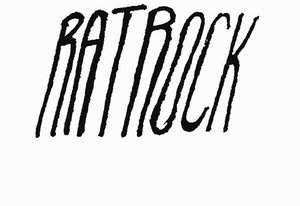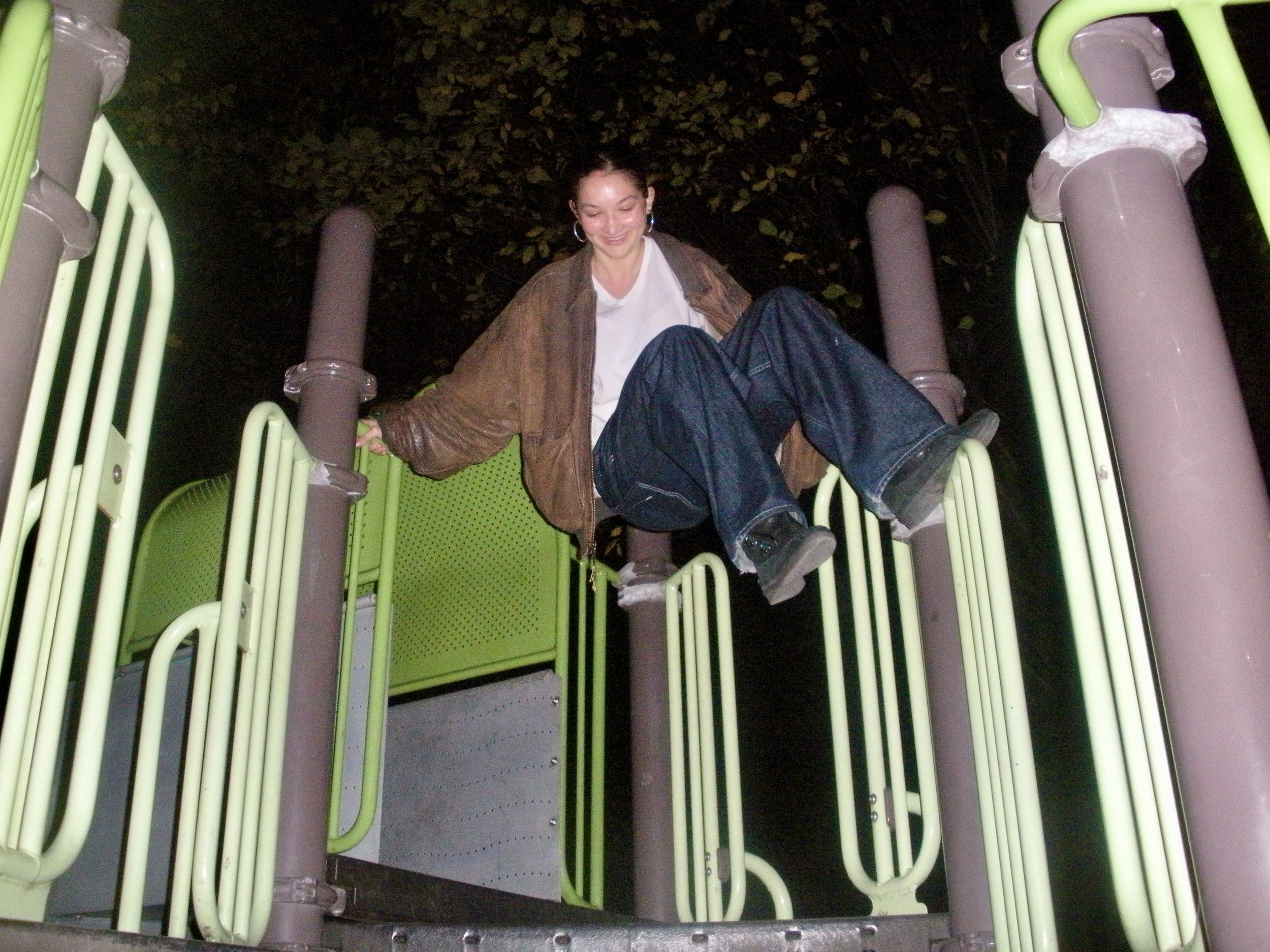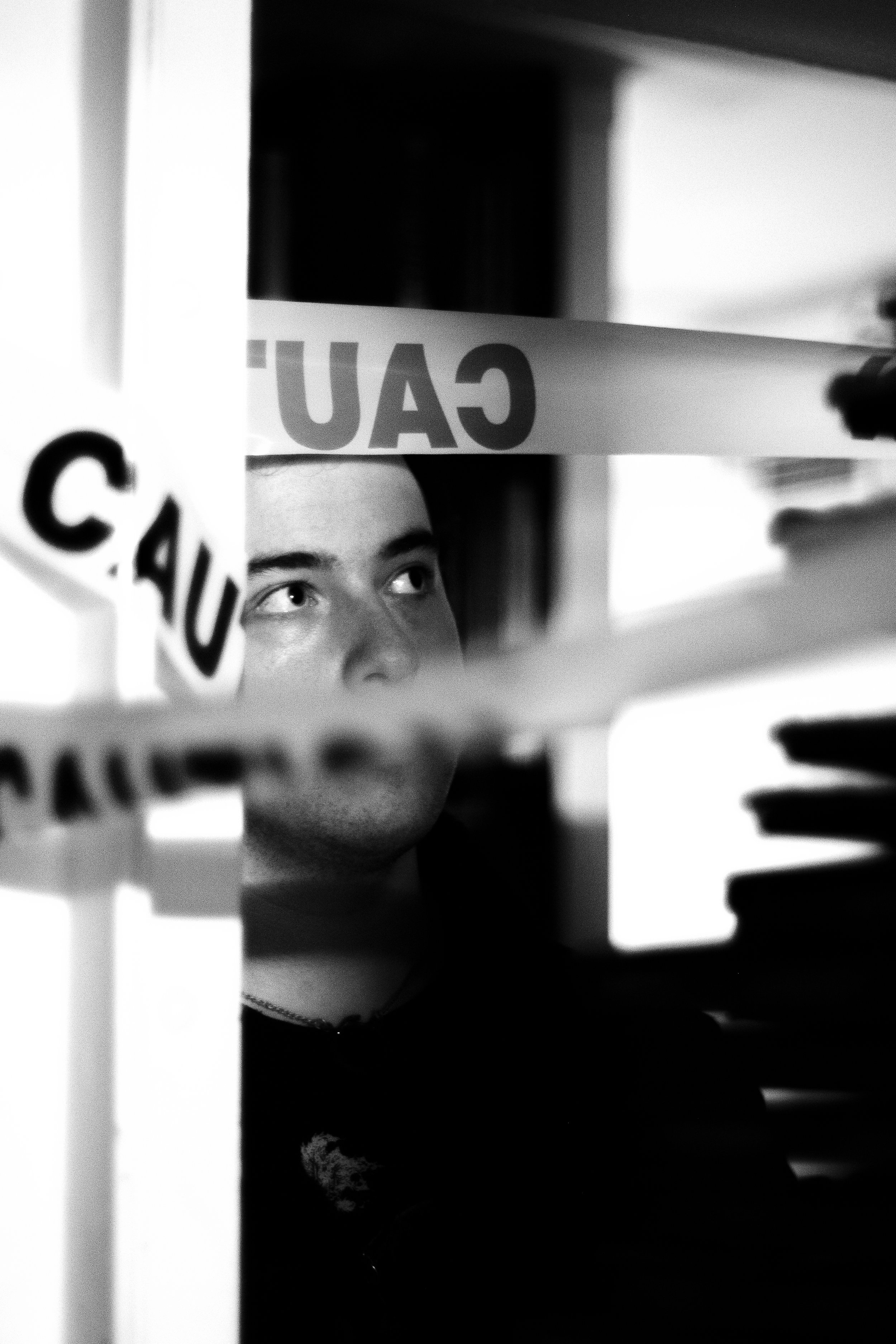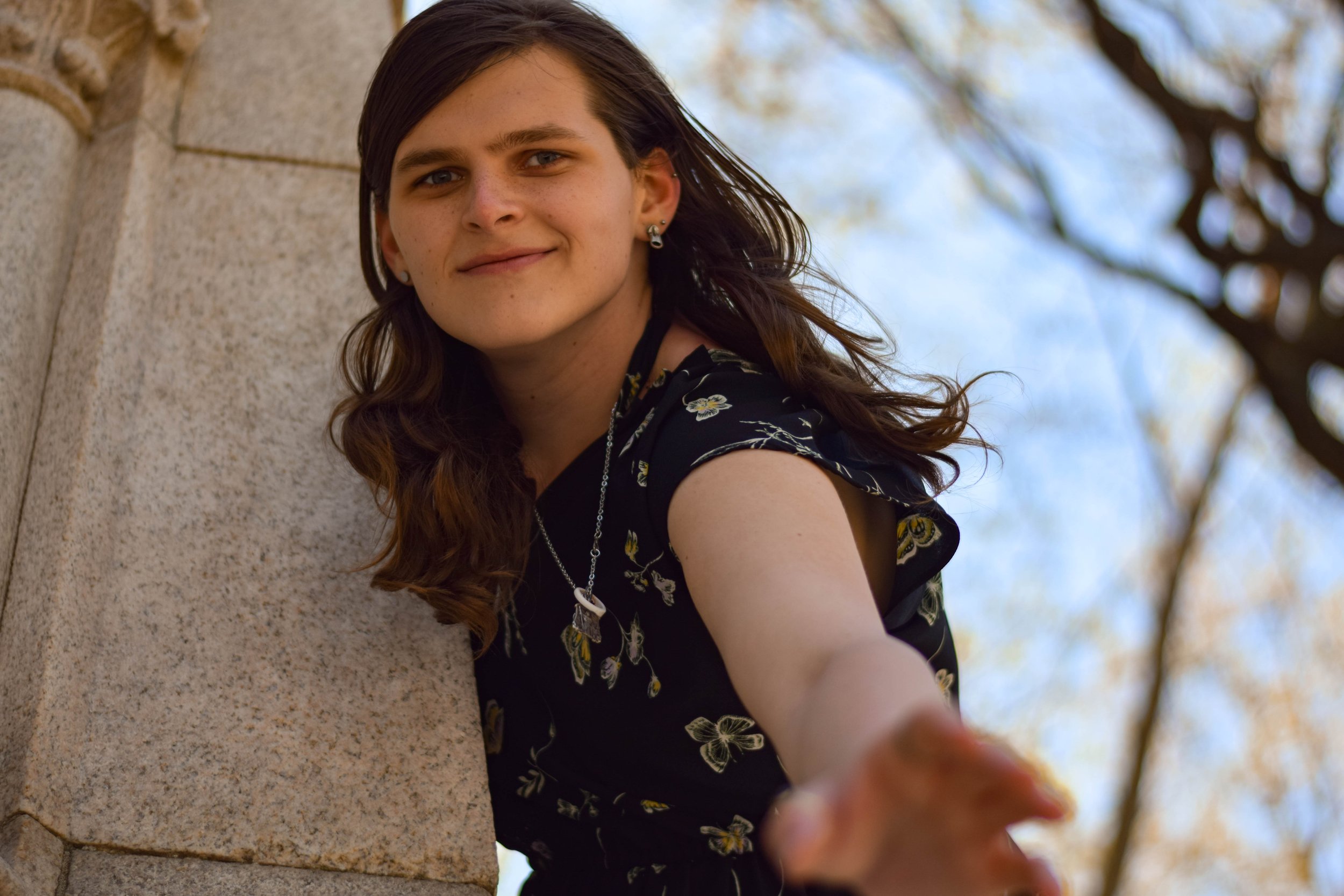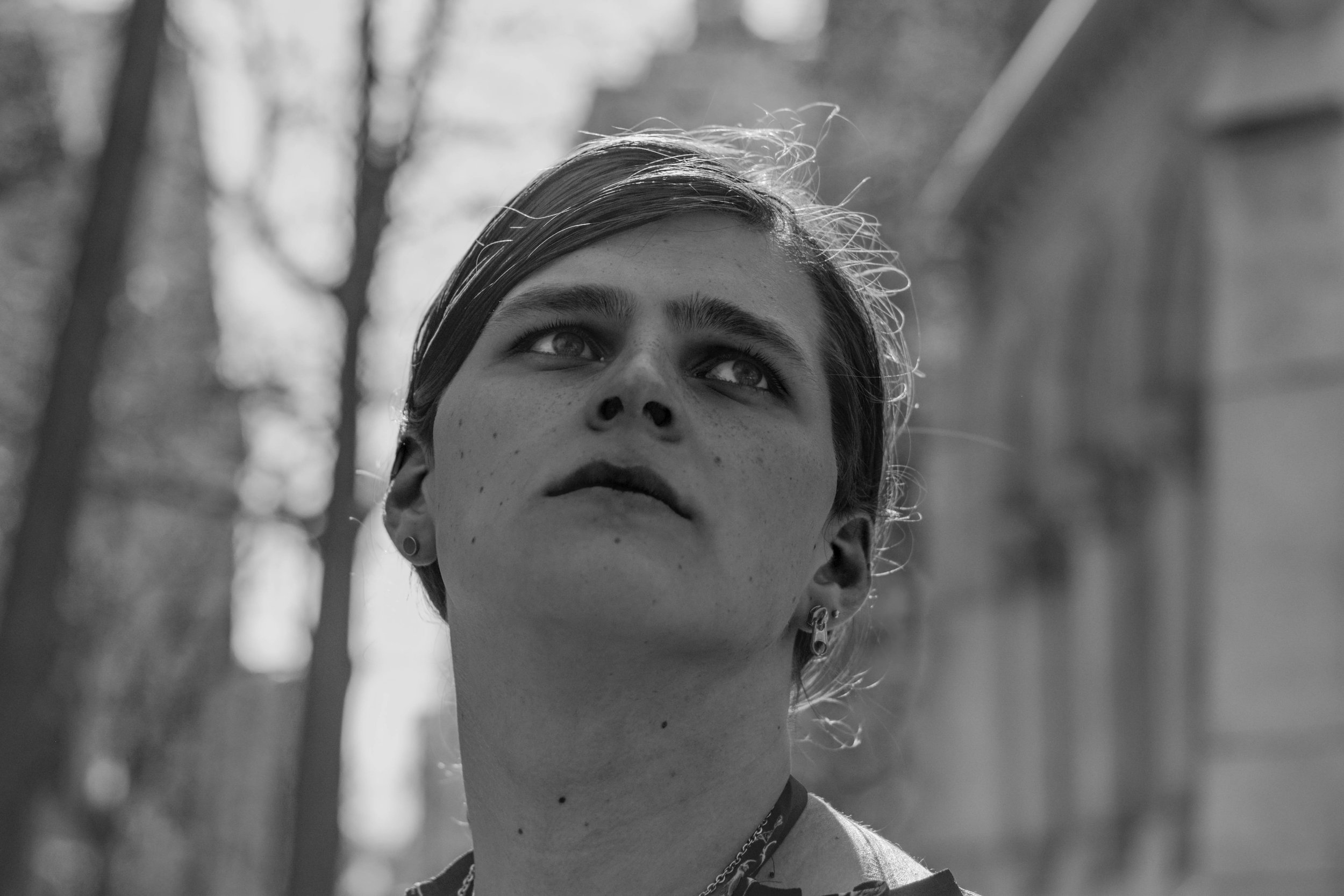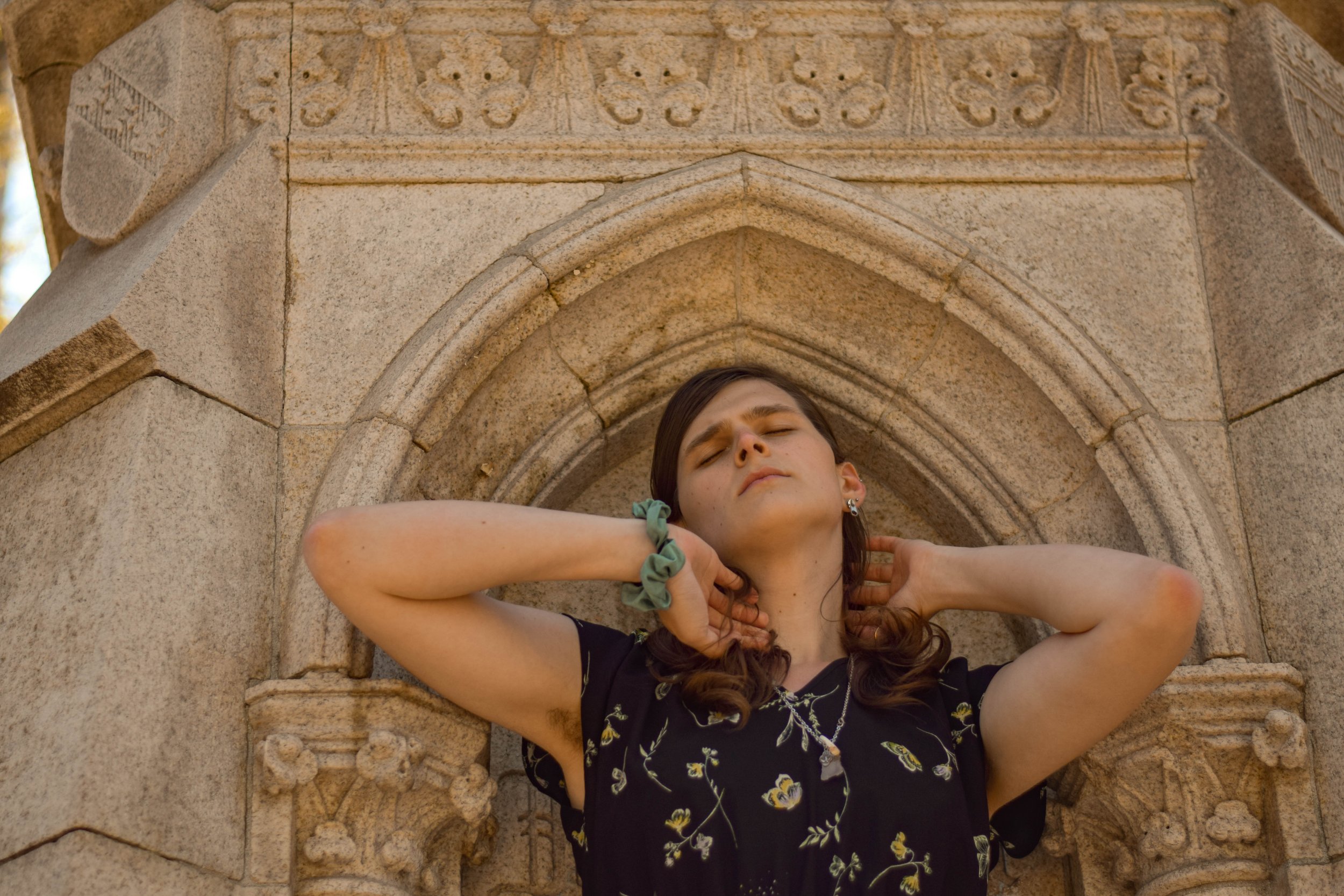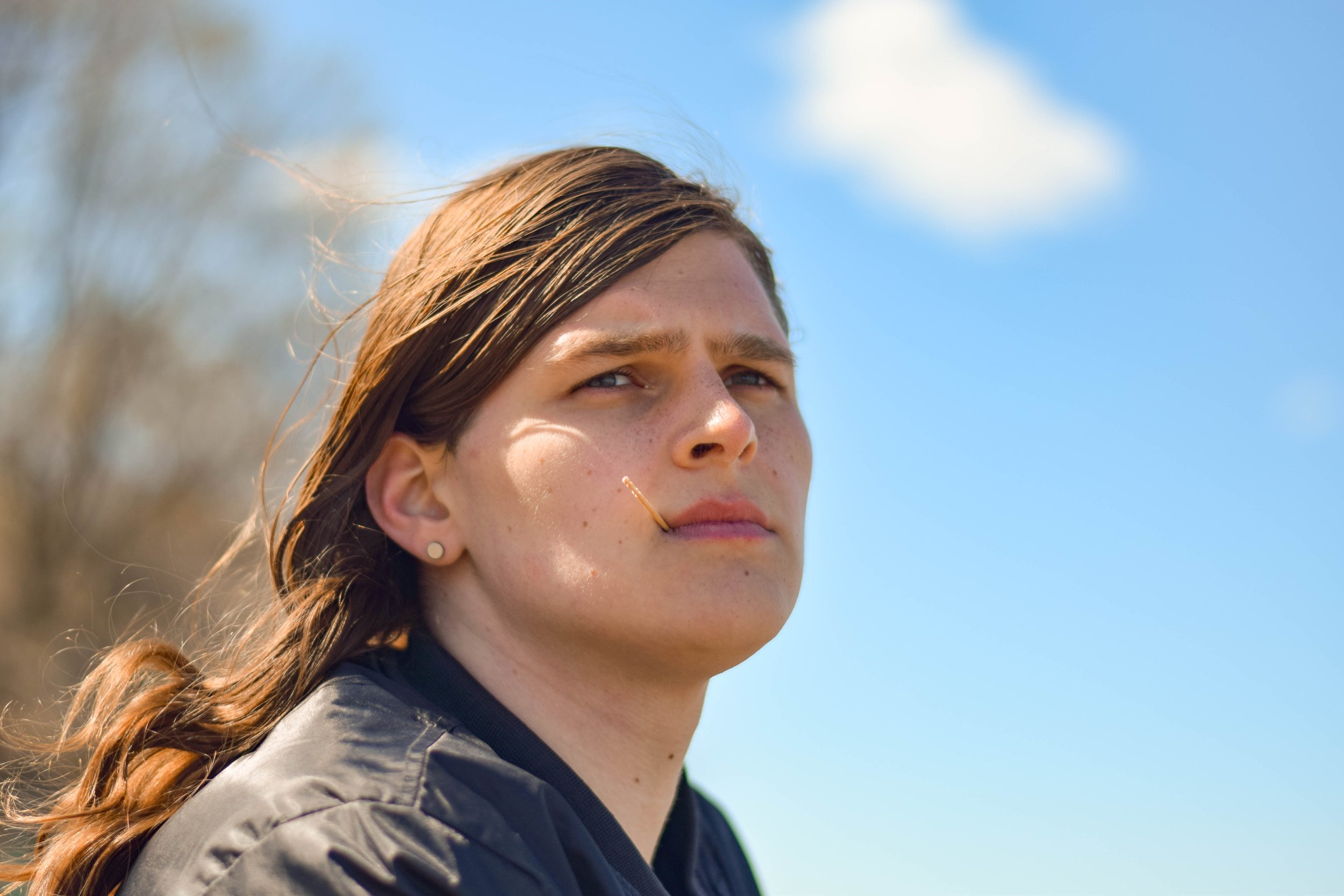Feature by Anna Lugard
Photos by Maria Shaughnessy
Editors note: the original piece published about Joan was a mistakenly uploaded snippet of her feature, and not the final version. Below is the updated and completed feature.
Joan Alice Tate is a Senior in CC studying creative writing with a focus in poetry. Joan’s work draws from her experiences growing up southern, spiritual, and closeted. She is interested in the body and mind as a locus for change, development, evolution, annihilation, and hope. She will be attending UMass Amherst’s MFA Program this upcoming fall.
Joan Alice Tate exudes an easy confidence and an air of calm. She strides up to me without a hint of the typical harried Columbia speed-walk. We are meeting in Riverside park, Joan’s preferred creative space, on what feels like the first day of spring in the city. Joan tells me she has just arrived from a meditation class and is feeling at peace. We sit down at a bench overlooking the water to discuss her poetry and creative process.
Joan was raised across the state of Virginia, moving from the North to the coast, and eventually settling in Appalachia, just outside the town of Roanoke. She grew up in a uniquely religious environment: her father is a fifth-generation minister in the United Methodist Church, and many of her other family members are also ordained. Joan’s religious background is an ever-present theme and inspiration in her poetry. However, her spirituality has expanded widely beyond its Southern Protestant origins. Joan describes her spiritual beliefs as “an amalgamation of Buddhism, Protestantism, Christianity… Catholicism, and Taoism.” She takes inspiration from Catholic mysticism and Jewish intellectualism, citing Simone Weil, Walter Benjamin, and Franz Kafka as some of her creative influences. She is currently finding the most stability in Buddhism, and regularly practices sutras and meditation.
Joan enjoyed an exceptionally literary upbringing. She grew up going to sermons every Sunday, which first kindled her interest in creative writing: “I loved listening to people talk, and the poetry of the bible. I became obsessed with words.” As a child, she was “a voracious reader” and wrote short stories in her free time. In middle school, she began experimenting with spoken word poetry, a phase she is grateful for - “it got my bad poems out really early.” By the time she was applying for college, Joan knew she wanted to become a writer.
Joan’s journey from Virginia to New York was “a flight - that turned into an embrace of something new.” She describes her time at Columbia as divisible into two phases, separated by her gender transition halfway through college. As a freshman, she felt “angsty, frustrated, chaotic, and unsure about how to get to a point,” sentiments that came through in her creative work. Post-transition, she drifted away from Columbia and began investing in close relationships and immersing herself in city life. Her writing reflects this evolution: “Poetry was one of the ways that I processed my transition… it became more explorative about what it means to be a woman in general.”
Dykin’ it
I used to beat the shit out of my guy friends in high school
on the pavement or in the puce government carpet
behind a wall of backs we’d tuck away and
I never let go of a wifebeater, a crew cut. I dug in for the crowd
and stomped guts so hard Paul puked
sprinkler style all over his crisp ROT-C fatigues, laughing with the devil.
We all were full of passions. Mine was love.
All those men, now mechanics, section 8’s, cops,
pushers, and marines. To say I’ve stepped off that boat
isn’t wrong but it’s certainly misguided.
I never tried to be one of the boys,
I was just dykin’ it.
I was helping men see stars
the only way I knew how
Moving to New York played a crucial role in Joan’s creative expansion. She characterizes the South as a “gorgeous but very fraught place.” As someone who “grew up very strangely, gender-wise,”, Joan experienced “an odd discomfort of knowing and overhearing things you are supposed to overhear, about how you are meant to conform.” After moving to the city, she felt a new sense of freedom. Joan describes New York as a major creative influence: “I’ve tried to embrace the city as much as I can… being able to step out and see the city, to be myself and finally feel like my self is really wonderful––I think that is where a lot of the joy and brilliance in so much of my recent work has come from.” Joan is a “big fan” of the New York school of poets, including Frank O’Hara, “one of the central pillars” of her poetry. Joan also takes inspiration from Eileen Myles and Alice Notley, to whom she owes her middle name. Joan sees the quiet moments in the city as “at the core of the beauty that these poets capture.” However, she concedes that the best part about New York is that “you see so much insane shit - that inspires you, or makes you sad - there is so much in the city that has informed my practice. New York has really become my home.”
Two Grief Portraits
A. Still Life of Dead Hares
Our warrens have
run empty. My haunches tense
and moan awaiting
the bang of a gun
the shot of a redtail
from across the field.
The folded ears you water,
the clovered eyes
leaned on for years
look in from the threshold
before they sprout with iron.
I am waiting.
In the dark I am
waiting for the rest,
those dolls from up before
the strait-hatch opens...
B. Self-Portrait with Cropped Hair
... and the deed is done. The door locks and the chair
sits softly, creaks
just before my seat hits the wood. A softened hand chokes the shears.
A group of ghosts is called an influence.
A group of hares is called a braid.
As if excess might be substitute for identity, long before
staring blindly out at passing songs, the slits of rain that open
with the AC hum and
a buzzing in the ear like how Grief manifests,
usually as a ring of keys in your pocket
leading you through a spine of doors.
A group of sinners is called a party.
A group of sticks is called a faggot.
Still, at night the sky remains lovely where'er we walk
(even if it is still not open for us) I worry about my eternal soul
falling down the stairs like a broken stone, or a burning chifforobe, like the light that leaves the stars for here
and can only call back
After Goya and Kahlo
Joan’s work is also influenced by her background in classical Latin. She has studied Latin since middle school and even considered minoring in it at Columbia. Joan describes herself as “a geek for Tacitus” and enjoys reading the poetry of Catullus, Horace, Ovid, and Virgil in their original Latin form. As someone who “tries to figure out what embodiment looks like through poetry” she appreciates how “in so much of Latin literature, the text itself becomes this living,
breathing thing.” Joan imbues the intellectualism of classical academia with a distinctly current mutability. She is inspired by Latin literature’s openness to interpretation: “In these poems, you have to choose a route you go with, in terms of how you are going to read this.” She attempts to emulate this multiplicity of meaning in her own writing: “I incorporate a lot of punning, and ambiguous strange descriptions that can be interpreted in many different ways. I try to give the reader many avenues to flow down so that you can come to a different conclusion depending on your mood.”
Joan describes her aesthetic voice as maximalist: “I like taking a poem or prompt and expanding it out into a lush, thick landscape. I want the reader to read the poem and embody its mental state, whether it is energetic, more sluggish and meditative, or insane madcap wacky bullshit. I want to create a playful space.” She has always found creative inspiration in the body, but her relationship to this subject has developed alongside her transition. “My poetry used to be entirely located within the body, and was viciously trying to get out of the body. As I transitioned, I was able to look outwards more. My poetry has expanded along with my own opening up.”
Psychopomp (2021)
... and in came Mrs. Swithin carrying a hammer.” - Virginia Woolf, Between the Acts
My elbow disconnects right at the socket
in most of my dreams of the Escort,for I won’t go.
And there’s a fabric flexing over the mouth,
your gentle brace of lights, that bullish notch we breathe from,
all vanish, clean behind the rag while feversweats soak in.
The snapping of the limb becomes a sonic rag of grit
teeth rubbing up against the sulphur binding to release,
to say the words oh kidnap(!), Carrion, cuc-kooo-Koo-kooo.
And I am just filled with Ordinations.
Just as the eyelid bats itself within its borders
I am racked within my spongey cell of revelation,
archedback praise, tensions unprescribed, the eye unglazed, takes in
an Ordination form from where that grounded sleep was torn
and led behind the heaving of the crows
or the lowing of the bull.
And now her dull-clack teeth are shaking you awake in time,
like the shiver of a blade upon my shoulder,
like our checkered kite, hanging in the gloam,
like my fingers, wrapped round some slipp’ry feature,
like the crick of an axe on pavement, they will say
she peeled that fucking jaw til both hands bled
Joan’s poem “Tetrapharmakos” reflects her evolving, fluid understanding of God. She now sees God “much more as some sort of working within the universe, a joy that bubbles up from within the cracks.” In her writing, Joan variously genders God as feminine and masculine. Her poetry and spirituality are “constantly in flux,” as is her gender presentation: “I try to be gender non-conforming. I enjoy being masculine sometimes, but I enjoy being a masculine woman… being a butch woman means being an expression of strength, an expression of confidence, an expression of love.”
Tetrapharmakos
After Arthur Russell
I’ve got a crush or two,
a brace of figures on bikes.
Persuade me and I’ll take the leap. Give me motivation
to kiss my bright God or the other one.
A barbwire pocket chain, a point of reference,
that’s what I need. Because I would like to look sharp like Death,
with his sockets and blisters. Who knew bone could blister?
Who knew bone could be that hot?
I’d love to lay by and pop them with sick and red.
Who knew I could be so frustrated by it. God of course
wasn’t a fan, but when has she sought, where has she been
all these years
I was waiting for her, with my top off and fainting, the engine running,
lusting itself and me, sipping exhaust
in the absence of motherhood and fanning without. Crude everywhere! The bass
strings she uses to keep her time were tweaked
out and rusted. They call God “Mama Sunbleach” where I’m from.
She kept a whammy pedal inbetween her eyes and
wiggled it with her will or angels. Oh God, what a pain,
what a disconnect. Meditation doesn’t work anymore,
I’ll try smoking cigarettes rolled up in painters tape.
The tether is cut with longing and
whiskers fly ou—
Bring out the bone-man! Stripped because
it can be so hot so often. Burn him in his cloak, like an effigy, or a spectacle.
What a scythe! But what does it add up to in some grand scheme or
under its wave and brokers. Where’s the food,
where’s the tents, the barrels, where are the gums who reject her rope
or his teeth? We were by the rail, winding over bridges, no keys,
when they sailed by, handinhand and I choked on steam to see them.
They mocked me over the rushes
mocked me saying
that which is terrible
is easy to endure
Recently, Joan has been working on a series of sonnets, a form she first experimented with in her freshman year of college: “I used to go to parties, drink a ton and sit in the corner writing the worst sonnets in the world.” Since then, she has mastered the art of the evocative sonnet; her poem “Femmin’ It” is a complex, tender expression of love for her partner. “Pulling from the well of joy and happiness that has come from being able to look at my body after hormones and feel really ok with that - and feel really ok with that with someone else - that has really been one of the great joys of my writing.”
Femmin’ It
She found her dog in a ditch in Ohio. Gambel like oak,
cutest mutt around with a whine like a teeny tugboat,
the face of a quail, grimey little ratdog, cutie-little-pie,
her Familiar, jealous he watches me writhing in my bubble and
you draw me out mouthful by mouthful, scoop by scoop,
emptiness becomes the prajna shown to me through
holding your convulsive sleeps, the stumbles through your hair I
mumble things you're always saying, i blub you, gly glub glu,
Chelsea Girl, my dame of renaissance passions
all parts are good parts with you Aspen,
your smell like cologne and salt, your poet’s eyes, I’m
speechless in throes when you call the quiet names, you are strong,
blemished, and brilliant súch thát you shine, long
tongued beauty, my animal contortion, marvelous ebullient
fever to my soul, my stunning Aspen hooked up to my roots,
when you stop to stare at me the world just happens to grow
Joan probes the supernatural in her poem “Nobody in my life has ever told me how ghosts are made and now I really need to know.” Ghosts are a common feature in her poetry: “I’m really interested in the transitory space. Ghosts, as a construct, introduce the liminality of being between worlds, see through yet tangible.” Joan finds that the supernatural has the power to defamiliarize, to “break you out of your everyday life.” In general, Joan hopes to write poetry that will jolt the reader out of their ordinary existence - or rather, jolt them into a deeper understanding of the ordinary. “You read a poem, and suddenly a tree is not a tree, a tree is a reminder of someone who has left you, or life, or growth, or death. Poetry is a means of expanding language, and as a result, expanding experience. We are in a society that is so saturated with language that when a word means more than it used to mean, your entire world has expanded.”
“Nobody in my life has ever told me how ghosts are made and now I really need to know”
I just assume there’s this
iron lungmachine, god uses when he’s sad or heavy, just a
squnch of the torso and out of his breath and beard coughs proto-plasmic goo.
Yes. Of course. A phlegm of god,
a reliquary slime I’ll file away in jars and beakers and bathtubs.
It's green and biley. It rumbles when we touch it. Its bubbles smell sweet.
I send it flowing through our pipes to hear its bright rustle,
wandering the walls, see
the subtle irradiated gleam as it makes its way
into our bathtubs, our sinks, the granite washbasins
we keep hanging by our beds. If you dip a feather or a thread in enough
and wait a week's time,
by jove you’ve got a ghost.
Wait no. That couldn't. My senses tell me
the ghostskin is knit softly between needles. Or, more likely,
pulled from the backs of the shyest spiders, yes, spindly fellows
dim and with drooping eyes, but helpful, vocationally inclined
to form it tender
into a net, deep in the dark where it might be private
or in the ground where it might be empty or holy
so that the web might stitch together
so taut the spirits can
push their rounded heads upon the center, have made just for them a fine white sheet,
a doily, hanging with loose tendrils and flying silver threads by the breezes blown
and a million little eyeholes who turn crimson with sunlight
like freshly pulled glass.
Or I could be wrong again, terribly mistaken so this protoplasmic
fibre which is spider-guided is instead
a red herring. Is instead, only attracted to
the loose lint who bounces in your ears and pockets. who fills the bellies
of stuffed bears, mother geese. The squishy blue iguana’s beads
belong in ghost guts.
And so does mother’s roughspun Sally, my hawkish doll, with
her red dress, her orange chords and bow letting
faint smacks waver through my wet skin. my cold clothes.
and her bright eyes lodged ahead
to ring some darkened comfort from when mother set her down between
my palms. The fetish I squeezed through the brilliant door
to protect me in the street and barren attic. She
stirs in trembling fingers, holds vigil as the ghosts rush madly like trucks or moths
barreling into my light
Joan hopes to publish a manuscript after she completes her graduate degree. She is considering returning to New York to teach but may decide to pursue her spiritual path instead and join a Buddhist monastery. When asked about her idea of perfect happiness, Joan shares that she would love to live in a lighthouse with her girlfriends and write poetry. For now, she will be living in Massachusetts attending UMass Amherst’s MFA Program for Poets & Writers. You can find more of Joan’s work in 4x4 magazine and Quarto magazine.
RGB Prosthetic: Session 3
FOCUS ON WHAT HASN’T BEEN FORGOTTEN.
START. Heat. Yes. There was a thickness in the skin. No,
too anaphylactic. A hole in the backmolar? Not quite yet. A hot
thread of iron. a needle held in a pilot light. More. The
flashlight shining behind the eyelid or the sun poking
through chemical plants? Exhaust. Evening like beginning.
When? Evening without time. I said when? The tip of her
stained cigarettes. Before that. A sun settling into the
horizon. so it sears the cows bloody. for weeks it’s just
sitting there. Right. Red Feathers. You were working your
apple with a knife so its peels curled into the cream
colored bowl. Lipstick. She licked her knife and yours. She
had grey fuzz on her top lip. Bucket after bucket full of rouged
skin you chewed like tickertape. Both your fingers ran raw
with callouses and brambleblood. Blackberry blood. The
stain where a face clipped the ledge below. Not yet. The
furrowed brow of a turkeyhen. After. The summer the dogs
went loose. the sun called you names from across the
garden. afterimages hung like sores. Summer leaves
reddened. they turned into dry smoke. Chiminea. Hellmouth.
Armchair. Furious gashes appeared on pink portraits. the
cross shattered. Shame. The paperback by the bed? or the
kitchen ashtray? The Ashtray. A wheelbarrow full of
feathers. More. A clean cat. a cut tip. Are we off track? A set
of red heels. Click. A new scab. a sun torn. Click. You
looked for kindling. slept in leafbeds. Spark. looked out at
the sky trembling because, the moon fizzed like a dry matchhead
CALIBRATION COMPLETE.RUNNING
SUBALTERN ANALYSIS. The retaining walls were hewn
apart by kudzu. the kudzu licked the bricks like flame.
What? An olive hoodie with “FUCK WOLF MAN” on the
back. was that here? The vines she whispers she loves under
the tide. over the yelling and her split green door she
smiles. brown door. A horde of funny needles prickled
against your new feet. i was breathing buckets of tulips. Light
through the mist of cut grass. i was so small. A lop of
hedgeflesh on the dusty road. the faint blip of fireflies
cutting gloam like a screwdriver. Beer Bottles. mason jars. The
house never stood right. the fields behind were like paintings of
Railcars. There's that butterknife you stowed under your
pillow. from what? The lights had gone out. a lack of lips.
Thick green smoke rooted through the chairs and the barn
doors. the goat cried like a man. There was a bird in the dark I
think. a bat. The flick of crisp heatlightning overhead as you
arrived. flight. silence. was that shame? The skim of energy
flooding across a field. in waves. You left the car and
prickled with ozone. you wriggled like the chrysalis you
stowed in the boarded chimney of the barn. I'd forgotten.
You covered it with a seafoam tarp. A crutch. An iron lung.
A chance. No one’s redemption. You found its wings half a
year later, that stale cornrow green. They snapped dry like
wafers. You couldn’t stop touching them. It wasn’t my fault.
The sound of spry greenwood bubbling in the flames.
CHECK COMPLETE. RUN. Do you like the way that
sounds? I d-The way I can temper? I never cooled. Do you
feel it? Y-The way the prosthetic reads and refracts you?
Like here. in her garden. You remember your uncle had a
macaw. Yes. Unmarried. You’ve only seen pictures of him
petting the thing. Maybe. Its wings were azure, sparkling the
same color of painter’s tape. Blue Shoes. like a set of lips. I
never saw it. The bird opened like a marlin behind the
screendoor. only in photos. Like light that plummets through
stained glass. He couldn't name it. It would make this sound.
Erin. Erin. Again and again his name he lives with his
mother, 80, and his father before he died she’s been hiding
her easter eggs in the nightgristle in the bluegrass remember
the bruises she gave your mother for prom night the
butterflies she caught you with a slap of palms. I killed it
didn't I? Lepidops. Pasture Sky. Sheets of water flapping in the
thunder. Where? I doubt it ever rained. A new pack of bicycle
cards was always strewn across the floor his cobalt guitar
leaned on the mantlepiece. The first time I saw the ocean I thought I'd
never shut my eyes. Back. That isn't here. It is the heat of
Summer in haunted pastures the macaw escaped bloodhaunted
and caterwalling as it flew through the slanted house calling for
him its falconer father keeper friend your grandma fried
chicken in her 12 inch pan and said it sailed “clean into the
skillet.” dead as a doornail it started raw as if it wanted to burn
but she crisped it up and blistered her fingertips pinching
at the the lost feathers the pilot light a Blue Feather She put
meat to work. Of course. Cooked a plate of parrot for supper
and sat on the porch waiting for the faggot to arrive. He
was always always late. never wanted to talk. She laughed pink
and blue when he arrived. Wait. He dropped the plate. I
know. I’m do-Kicked off his cowshit work boots. chipped the
skirting board. plucked a flame from off the stovetop. He sat there
s-Boiling into the porchlight. Easing into Lunacy: our rawest kind of
violence. Heaving so hard the grief had pickled his lungs to fat blue blots of smoke
